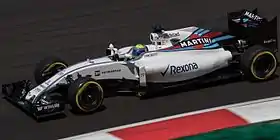Williams FW38
The Williams FW38 is a Formula One racing car designed by Williams to compete in the 2016 Formula One season. The car was driven by Felipe Massa and Valtteri Bottas.
 The Williams FW38, driven by Felipe Massa, during the 2016 Malaysian Grand Prix. | |||||||||||
| Category | Formula One | ||||||||||
|---|---|---|---|---|---|---|---|---|---|---|---|
| Constructor | Williams | ||||||||||
| Designer(s) | Pat Symonds (Chief Technical Officer) Ed Wood (Chief Designer) Jason Somerville (Head of Aerodynamics) | ||||||||||
| Predecessor | Williams FW37 | ||||||||||
| Successor | Williams FW40 | ||||||||||
| Technical specifications[1] | |||||||||||
| Chassis | carbon-fibre composite and aluminium honeycomb monocoque | ||||||||||
| Suspension (front) | double wishbones, push-rod actuated springs and dampers, anti-roll bar | ||||||||||
| Suspension (rear) | same as front | ||||||||||
| Engine | Mercedes PU106C Hybrid 1.6 L (98 cu in) direct injection V6 (90º) turbocharged engine, limited to 15,000 rpm in a mid-mounted, rear-wheel drive layout | ||||||||||
| Electric motor | MERCEDES AMG HPP ERS Mercedes PU106C Hybrid Motor Generator Unit–Kinetic (MGU-K) Mercedes PU106C Hybrid Motor Generator Unit–Heat (MGU-H) | ||||||||||
| Transmission | Williams 8-speed sequential semi-automatic Williams paddle-shift 8-speed semi-automatic | ||||||||||
| Battery | Lithium-ion batteries | ||||||||||
| Weight | 1,548 lbs | ||||||||||
| Fuel | Petrobras | ||||||||||
| Brakes | AP Racing ventilated carbon ceramic discs, 6-pot caliper | ||||||||||
| Tyres | Pirelli P Zero (dry) tyres Pirelli Cinturato (wet) tyres Front:245/660 - 13 / Rear:325/660 - 13 | ||||||||||
| Competition history | |||||||||||
| Notable entrants | Williams Martini Racing | ||||||||||
| Notable drivers | 19. 77. | ||||||||||
| Debut | 2016 Australian Grand Prix | ||||||||||
| |||||||||||
The FW38 used the Mercedes PU106C Hybrid power unit. During qualifying for the 2016 European Grand Prix, the FW38 set the highest ever recorded speed of a Formula One car during an official session, at 378 km/h (235 mph).[2]
During the 2016 Mexican Grand Prix, the FW38 set the second highest ever recorded speed of a Formula One car during a race, at 372.5 km/h (231.5 mph).[3]
Due to a lack of upgrades to the car, which was basically similar to the Williams FW37, the team eventually lost 4th place in the constructors' championship to Force India.
History
The car proved to be competitive in the early stages of the championship, with Massa and Bottas securing points finishes for the first half of the season, however lack of upgrades on the car meant that the team could not keep up with other teams during the later stages, such as Ferrari, Force India, and Red Bull Racing, and eventually lost 4th place in the constructors' championship to Force India.
Complete Formula One results
(key) (results in bold indicate pole position; results in italics indicate fastest lap)
| Year | Entrant | Engine | Tyres | Drivers | Grands Prix | Points | WCC | ||||||||||||||||||||
|---|---|---|---|---|---|---|---|---|---|---|---|---|---|---|---|---|---|---|---|---|---|---|---|---|---|---|---|
| AUS | BHR | CHN | RUS | ESP | MON | CAN | EUR | AUT | GBR | HUN | GER | BEL | ITA | SIN | MAL | JPN | USA | MEX | BRA | ABU | |||||||
| 2016 | Williams Martini Racing |
Mercedes PU106C Hybrid |
P | Felipe Massa | 5 | 8 | 6 | 5 | 8 | 10 | Ret | 10 | 20† | 11 | 18 | Ret | 10 | 9 | 12 | 13 | 9 | 7 | 9 | Ret | 9 | 138 | 5th |
| Valtteri Bottas | 8 | 9 | 10 | 4 | 5 | 12 | 3 | 6 | 9 | 14 | 9 | 9 | 8 | 6 | Ret | 5 | 10 | 16 | 8 | 11 | Ret | ||||||
† Driver failed to finish the race but was classified as they had completed greater than 90% of the race distance.
References
- "Williams Martini Racing Launches FW38". Williams Martini Racing. 19 February 2016. Retrieved 27 June 2016.
- Collantine, Keith (20 June 2016). "Williams hit record speeds on and off the track". F1Fanatic. Archived from the original on 20 June 2016. Retrieved 20 June 2016.
- "Williams clocking second highest fastest speed at 372.5km/h during race". F1Fanatic. 8 November 2016. Retrieved 30 October 2016.

